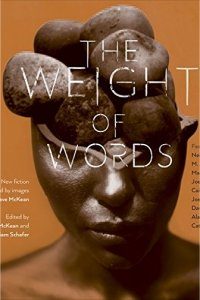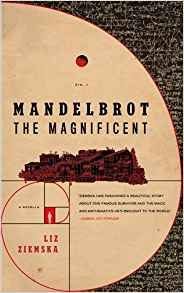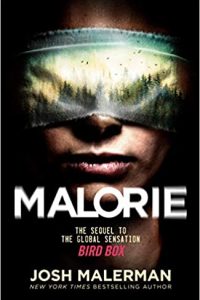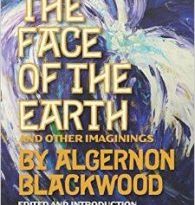Gary K. Wolfe Reviews The Weight of Words edited by Dave McKean & William Schafer
 The Weight of Words, Dave McKean & William Schafer, eds. (Subterranean 978-1-59606-825-4, $40.00, 248pp, hc) December 2017.
The Weight of Words, Dave McKean & William Schafer, eds. (Subterranean 978-1-59606-825-4, $40.00, 248pp, hc) December 2017.
At least in the SFF world, Dave McKean’s prolific multimedia career is most often associated with that of his frequent collaborator and pal Neil Gaiman, who has two short pieces in The Weight of Words, a fascinating anthology edited by McKean & William Schafer in which ten authors – including McKean himself – write stories in response to one of McKean’s paintings. It’s always fascinating to watch the literary imagination in dialogue with the visual; Charles Vess did something similar last year with Walking Through the Landscape of Faerie, and several years ago Harlan Ellison published a volume of his own stories written around Jacob Yerka paintings – but the tradition goes way further back than that. McKean’s often collage-like style – sometimes surreal, sometimes expressionistic, sometimes incorporating photographic elements – would seem to lend itself readily to narrative, but what the contributors have come up with here is often surprising.
I’ve never associated McKean’s work much with SF, for example, but three of the stories here are more-or-less straight SF. The best of these is Alastair Reynolds’s “Belladonna Nights”, set in the galactic far future of his House of Suns and concerning an epic, thousand-night reunion of the scattered versions of humanity that populate this universe. The story not only makes direct use of the McKean illustration that accompanies it, but manages to convey in a relatively concise, well-plotted tale, much of the awesomeness of scale of a full space opera. Joe Hill’s “All I Care About Is You” is one of the more surprising entries, a touching (but finally unsentimental) tale of a poor teenage girl in a brutal, polluted future, who finds a way to celebrate the birthday her father can’t afford (he lost his job as a professional murder victim when he was too damaged to be repaired) with the aid of a near-obsolete robot she befriends. Joe R. Lansdale’s “Robo Rapid”, though, is almost too familiar in its setting – another bleak world in which diminishing human tribes are on the run from the giant “Robo Rapid” war machines built to fend off an alien invasion generations earlier. The girl narrator, as in the Hill story, is appealing, even if there are a few too many echoes of Terminator and Mad Max movies.
Some of the contributors take advantage of McKean’s often fractured images (heads or faces that could either be in a state of incompleteness or a state of decay) to create fractured narratives. Iain Sinclair’s “Broken Face” is nearly a fantasia on themes of photography and film suggested by McKean’s image, which is quite literally of an ominous-looking broken face wearing a toque with odd symbols. Noting a vague similarity of this image to an actual photograph of the playwright Sean O’Casey, Sinclair explores possible stories that eventually invoke everyone from Ingmar Bergman to Marilyn Monroe and Jack the Ripper. Caitlín R. Kiernan nests stories within stories in “Objects in the Mirror”, an exploration of the doppelganger theme that begins as a screenplay set in a therapist’s office, but weaves in a tale from the narrator’s childhood and a museum visit, which in turn evokes a near-death adventure of an apparently Neanderthaler girl. Maria Dahvana Headley’s “The Orange Tree” takes a more disciplined, almost academic approach in describing, in quite moving terms, the coming to awareness of a female golem created out of wood by an 11th-century Andalusian poet (an historical figure, according to her afterword). M. John Harrison in “Yummie” personifies the aftereffects of a heart attack in the mysterious title character who haunts the victim during his recovery. McKean’s own “The Language of Birds” even takes advantage of typographical tricks, in a rather touching tale that tracks a dreamer’s life from childhood.
By far the most ambitious of these more or less experimental fictions is Catherynne Valente’s remarkable “No One Dies in Nowhere”. Spinning off from an image of a cloaked figure with an ibis-like head, Valente essentially re-imagines Dante’s Purgatorio as a murder mystery, with Belacqua (a minor figure personifying laziness in Dante) turned into a detective trying to investigate an impossible murder in the afterlife city of Nowhere, while telling the parallel story of a young woman named Pietta. Of course the stories eventually intertwine, and Valente even organizes the story into purgatorial “terraces” (The Proud, The Wrathful, The Ambitious, etc.), although they’re not quite Dante’s terraces and not quite in the same order. It’s one of the most ambitious re-imaginings of the afterlife I’ve seen in some time.
As for McKean’s more familiar collaborator, Gaiman provides a delightful trickster creation fable in “Monkey and the Lady” – although the trick is not quite what you would expect – which matches seamlessly with McKean’s image of a monkey looking at the stars; and a much more elegiac, very short (less than a hundred words) meditation on literature in “The Train of Death.” The last prose piece in the volume, it’s a nice bookend with McKean’s own opening graphic story, “The Weight of Words”, which is a literal realization of its title, as an unpleasant message – described as a kind of stone, and never made explicit – passes from one figure to the next, changing its size and weight in the process. It’s a good introduction to a unique and daring anthology.
Gary K. Wolfe is Emeritus Professor of Humanities at Roosevelt University and a reviewer for Locus magazine since 1991. His reviews have been collected in Soundings (BSFA Award 2006; Hugo nominee), Bearings (Hugo nominee 2011), and Sightings (2011), and his Evaporating Genres: Essays on Fantastic Literature (Wesleyan) received the Locus Award in 2012. Earlier books include The Known and the Unknown: The Iconography of Science Fiction (Eaton Award, 1981), Harlan Ellison: The Edge of Forever (with Ellen Weil, 2002), and David Lindsay (1982). For the Library of America, he edited American Science Fiction: Nine Classic Novels of the 1950s in 2012, with a similar set for the 1960s forthcoming. He has received the Pilgrim Award from the Science Fiction Research Association, the Distinguished Scholarship Award from the International Association for the Fantastic in the Arts, and a Special World Fantasy Award for criticism. His 24-lecture series How Great Science Fiction Works appeared from The Great Courses in 2016. He has received six Hugo nominations, two for his reviews collections and four for The Coode Street Podcast, which he has co-hosted with Jonathan Strahan for more than 300 episodes. He lives in Chicago.
This review and more like it in the January 2018 issue of Locus.





